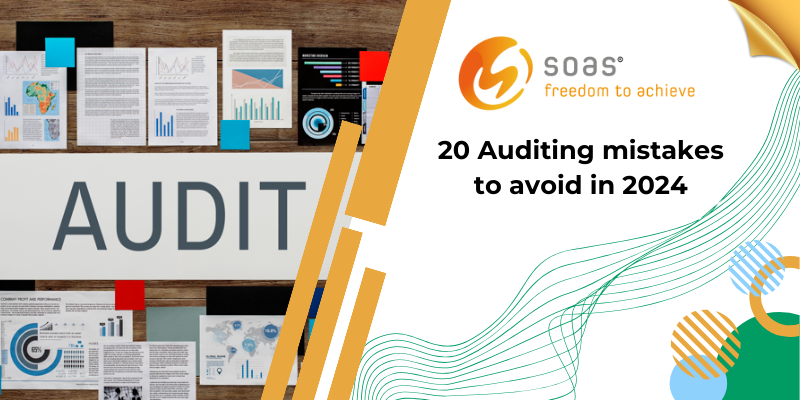20 Common Auditing Mistakes to Avoid in 2024

- Insufficient Planning: Inadequate planning can lead to oversights. Plan thoroughly, considering all relevant factors and potential risks.
- Lack of Understanding of the Business: Auditors should have a deep understanding of the audited entity’s business, industry, and operations to identify key audit risks.
- Failure to Update Audit Programs: Outdated audit programs may not address new risks. Regularly update audit programs to reflect changes in the business environment.
- Inadequate Risk Assessment: Failing to identify and assess key audit risks can result in incomplete or ineffective audit procedures.
- Overreliance on Internal Controls: While internal controls are essential, overreliance without substantive testing can lead to undetected errors or fraud.
- Ignoring Fraud Risks: Auditors should actively assess and respond to the risk of fraud, considering both fraudulent financial reporting and misappropriation of assets.
- Poor Communication: Ineffective communication with management, the audit committee, and team members can lead to misunderstandings and missed opportunities to address issues.
- Inadequate Documentation: Thorough documentation is crucial for audit quality. Incomplete or unclear documentation can hinder the review process.
- Scope Creep: Stay focused on the audit scope. Expanding the scope without proper planning can lead to inefficiencies and oversights.
- Neglecting Analytical Procedures: Analytical procedures provide valuable insights. Neglecting them may result in missed anomalies or trends.
- Inadequate Professional Skepticism: Auditors must maintain a skeptical mindset. Failing to question management assumptions can lead to missed red flags.
- Failure to Address Going Concern Issues: Ignoring going concern issues can impact the auditor’s ability to provide an accurate and reliable opinion on the financial statements.
- Inadequate Independence Safeguards: Ensure that the audit team maintains independence and complies with ethical standards to uphold the integrity of the audit process.
- Inadequate Sampling Techniques: Incorrect or insufficient sampling techniques can lead to inaccurate conclusions. Use appropriate sampling methods based on risk assessment.
- Overlooking Subsequent Events: Failing to consider subsequent events can result in financial statements that are not reflective of the current economic environment.
- Inadequate Follow-up on Prior Findings: Unresolved issues from previous audits can carry over. Ensure that prior findings are appropriately addressed.
- Technology Overreliance: While technology is beneficial, overreliance without understanding its limitations can lead to errors in data analysis and interpretation.
- Inadequate Continuing Professional Education (CPE): Staying updated on industry developments is crucial. Neglecting CPE can result in outdated audit practices.
- Ignoring Regulatory Changes: Auditors should stay abreast of changes in accounting and auditing standards to ensure compliance.
- Inadequate Client Communication: Maintain open and transparent communication with the client. Failure to do so can lead to misunderstandings and delays in the audit process.
By being mindful of these common auditing mistakes, auditors can enhance the quality and effectiveness of their work, contributing to the overall reliability of financial reporting in 2024.
About SOAS
SOAS, a distinguished accounting and auditing firm headquartered in Singapore, has been delivering top-notch professional services for the past 15 years. Throughout its tenure, the firm has garnered a remarkable reputation, underscored by an impressive track record of 148+ positive reviews on Google. SOAS takes pride in its commitment to excellence and client satisfaction.
The firm stands out by deploying a highly skilled team of seasoned accountants and auditors. These professionals bring a wealth of experience and expertise to the table, ensuring that clients receive comprehensive and reliable financial services. With a focus on maintaining the highest standards in the industry, SOAS’s team provides tailored solutions that meet the unique needs of each client.
Beyond its longevity and positive reviews, SOAS distinguishes itself by not only offering standard accounting and auditing services but also by embracing a seasonal approach to staffing. This flexibility allows the firm to adapt to varying workloads and client demands throughout the year, ensuring that clients receive personalized attention and timely, accurate financial insights.
As SOAS continues to thrive in the dynamic landscape of accounting and auditing, its seasoned professionals and client-centric approach position it as a trusted partner for businesses seeking comprehensive financial solutions in Singapore and beyond.
